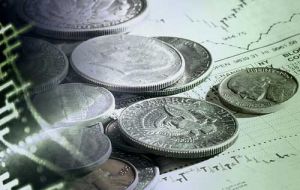MercoPress. South Atlantic News Agency
US dollar in Chile looses 9.8%; 10 year low: 453 pesos

The US dollar marked its sixth consecutive fall and reached a new ten year minimum against the Chilean peso pushed by the interest rates differential between Chile and United States and the sustained growing price for copper.
But in Europe the US dollar halted its decline against the Euro and Sterling, ahead of a Euro zone interest rate decision on Thursday. Money markets in Santiago closed at 453 Chilean pesos for the US dollar, its lowest since May 14, in 1998. So far this year the greenback has depreciated 9.86% against the Chilean peso compared to 6.44% for the whole of 2007. "The Chilean peso is favored by the rates differential with United States, which attracts capital funds to come looking for Chilean rates and the high prices for copper", said a Santiago money market operator. " "All this in the context of a very adverse global atmosphere with increasing fears about the extent of the US recession", he added. The basic interest rate in Chile stands at a nominal 6.25%, well ahead of that in the US which has seen the Federal Reserve cut interest rates drastically to 3% and prospects of further cuts when the Fed meets later this month. Besides copper Chile's main export reached on Tuesday a new maximum in 22 months in the London Metals market, 3.93 US dollars a pound, 1.4% up from Monday and closing on the 4 US dollars benchmark. Meanwhile in Europe analysts said the halt in the fall of the US dollar can be attributed to the coming European Central Bank meeting, which is unlikely to cut rates below the current 4%, but could hint to future cuts. The ECB expressed concern on Monday about the effects of the strong Euro on the region's cooling economy. One Euro bought 1.522 US dollar in afternoon trade, slightly off the all-time high of 1.528 it touched on Monday. Since the beginning of last week, the dollar has fallen against the Euro as analysts forecast steeper rate cuts in the US (whose economy has been hit by the sub-prime credit crisis) than in the Euro zone. Higher interest rates can make Euro zone assets relatively more attractive to investors. On Monday, the ECB president Jean-Claude Trichet expressed concerns about the rising Euro amid fears that the currency's strength could damage European exporter profits. The view was echoed by a group of Euro zone finance ministers. Analysts interpreted the comments as a call to the US to prevent further declines in its currency but did not see the comments as a precursor to immediate intervention in the currency market. In Paris International Monetary Fund Managing Director Dominique Strauss-Kahn said in an interview with the French daily Le Monde that the Euro was "overvalued" and pointed out that the US dollar was not so "undervalued as the Chinese Yuan or Japanese Yen".




Top Comments
Disclaimer & comment rulesCommenting for this story is now closed.
If you have a Facebook account, become a fan and comment on our Facebook Page!